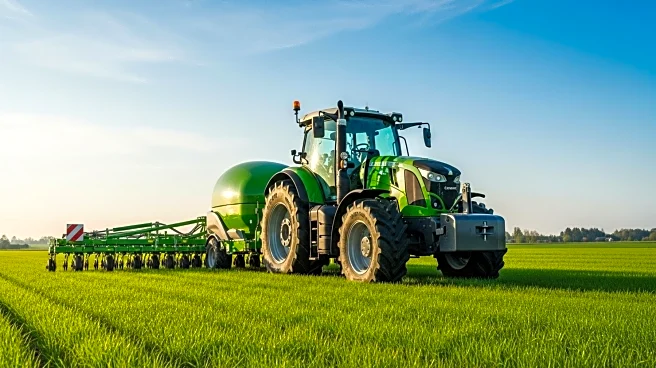What's Happening?
CNH Industrial, through its New Holland brand, is advancing sustainable farming practices by introducing the T7 Methane Power tractor. This innovative tractor utilizes biomethane as an alternative fuel, offering a sustainable energy solution for farmers. Christophe Rousseau, a French farmer and biomethane producer, has been trialing the T7 Methane Power tractor and has praised its performance, noting it matches the capabilities of its diesel counterpart. The tractor is equipped with a tank that holds 657 liters of gas, sufficient for an eight-hour work shift. CNH Industrial has also invested in Bennamann, a UK-based start-up that provides on-farm fueling stations and micro-digesters to convert cattle manure into fuel, further promoting energy independence for farmers.
Why It's Important?
The introduction of the T7 Methane Power tractor represents a significant step towards reducing the agricultural sector's reliance on fossil fuels. By utilizing biomethane, farmers can lower their carbon footprint and contribute to environmental sustainability. This innovation aligns with global efforts to combat climate change and promotes energy independence within the farming community. The investment in Bennamann highlights CNH Industrial's commitment to providing practical solutions that empower farmers to produce their own renewable energy, potentially reducing operational costs and enhancing the resilience of agricultural practices.
What's Next?
As CNH Industrial continues to develop and promote biogas technology, it is likely that more farmers will adopt these sustainable practices, leading to broader industry changes. The success of the T7 Methane Power tractor could encourage further investments in renewable energy solutions within agriculture. Stakeholders, including policymakers and environmental groups, may advocate for incentives to support the transition to sustainable farming technologies. Additionally, CNH Industrial's collaboration with Bennamann may expand, offering more farmers access to on-farm energy production capabilities.
Beyond the Headlines
The shift towards biomethane-powered tractors may have long-term implications for rural economies, potentially creating new markets for biogas production and distribution. This development could also influence regulatory frameworks, as governments may need to establish standards and guidelines for the use of alternative fuels in agriculture. Ethically, the move towards sustainable farming practices reflects a growing responsibility among corporations to address environmental challenges and support the global transition to cleaner energy sources.









